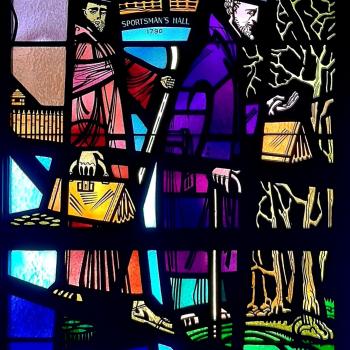Most importantly, my teacher understood all of the scriptural works well enough that she could cite themes and motifs that stretch across all of the books and all of the millennia. Thus, while studying the Abrahamic Covenant as we did in my Gospel Doctrine class today, my seminary teacher would show us how the promises made to Abraham had echoes in Jesus' life in the New Testament, Nephi's life in the Book of Mormon, and Joseph Smith's life in the Doctrine & Covenants. Learning how these books work together to reveal the Lord's plan for His earthly creations helped me to gain a love for the entire body of literature, not just the parts of the Book of Mormon I could understand or the Savior's pithy sayings in the New Testament.
Understanding the standard scriptural works as a body of interwoven literature demands, of course, a great deal from a Sunday School teacher. And our manuals don't demand that kind of expertise from our teachers because, in this Do-It-Yourself Church, that assigned teacher could be a brand new convert just as easily as it is a seasoned scriptorian. As much as I actually admire much of what is in our manuals, they are produced to feed a flock of millions in the world-wide church.
This perception of the scriptures as literature is unfortunately not something our Gospel Doctrine teachers can learn overnight. There isn't one book our teachers can read or one teaching trick that will suddenly turn the light on. This literary perspective only comes from living with the characters day in and day out, valuing all of the books of scripture equally and not just the Hit Parade of sermons or Scripture Mastery verses. It comes from understanding the narrators -- who is saying what to whom and why -- and the relationships of the characters to each other and the characters to God. I firmly believe that once we understand these elements of the narratives, the lessons of the scriptures will permeate our own characters without us having to resort to the frequent Gospel Doctrine lesson crutch of asking, "So, how can we apply this verse to our own lives today?"
I hope I can offer the older members of my new Gospel Doctrine class a new perspective on the Old Testament as we study it in our class this year. After all, they deserve to learn something new after sitting through similar classes for decades. I hope that for some of them it will be the first time they read this book as a work of great literature, with themes and patterns that extend into our modern day scriptures as well. I hope that they leave my class feeling less like they've just sat through a math quiz and more like they've just witnessed a great epic unfold before them. An epic that includes them.

Neylan McBaine grew up Mormon in New York City and attended Yale University. She has been published in Newsweek, Dialogue: A Journal of Mormon Thought, Segullah, Meridian Magazine and BustedHalo.com. She is the author of a collection of personal essays, How To Be A Twenty-First Century Pioneer Woman (2008), and the founder and editor-in-chief of The Mormon Women Project, a library of interviews with LDS women found at www.mormonwomenproject.com. She blogs at www.neylanmcbaine.com.




